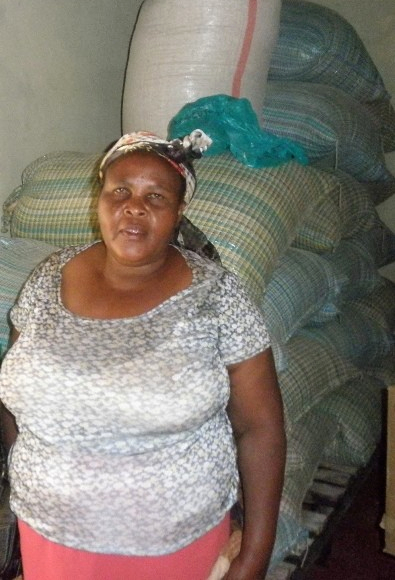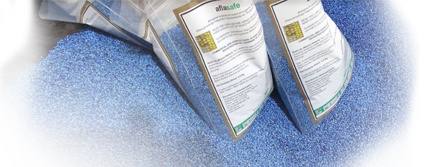Aflasafe at the 11th International Congress of Plant Pathology
Our science leader, Dr Ranajit Bandyopadhyay, shone on the international stage recently with a stellar keynote address at the 11th International Congress of Plant Pathology (ICPP), where he was joined by a constellation of other IITA researchers. So highly anticipated was Ranajit’s talk, on A multipronged approach for aflatoxin mitigation in Africa centred on biological control, that there was even a pre-event video trailer – watch below for a preview before you read on!

Ranajit took a new track, opening not with the science as usual but with people. In this case, a Kenyan grandmother, whose photo was his first slide. He took the picture after 2.3 million bags of maize were declared contaminated and unfit for consumption in 2010. “When I met this lady in 2011, she had already lost two family members to aflatoxin in the 2004 aflatoxicosis outbreak when 125 people died,” said Ranajit. “In the photo she is standing in front of her maize bags that she could now no longer sell, as people would not buy from her locality. She told me that she had lost income, and she was worried because she couldn’t afford to pay her grandchildren’s school fees. Because we can’t see aflatoxin contamination, it can seem abstract, but it’s very real and it hurts real people. Emotionally and morally, we are called to act.”
The ICPP itself is held only once every five years. The 11th congress ran from July 29 to August 3 in Boston, Massachusetts, USA, hosted by the American Phytopathological Society, with the theme of Plant Health in a Global Economy. Ranajit’s speech was part of a keynote session on ‘The role of plant pathology in food safety’, which included three keynote addresses: on mycotoxins – the one by Ranajit – pesticides, and biological contaminants.
Ranajit analysed the challenges in reducing aflatoxin contamination and discussed integrated aflatoxin management, using Aflasafe in combination with other practices, emphasising that no single approach is enough on its own. “You not only need the right technology but a comprehensive preharvest and postharvest aflatoxin management system, with policy and institutional support,” he said. “It also needs to be context-specific – you can’t simply take a system from one place and deploy it somewhere else.”

“When you use Aflasafe alone, you get large reductions in aflatoxin – around 80–100% – but you don’t always get it down low enough to meet safety standards. It’s the same with postharvest aflatoxin management. But if we combine all available technologies, you get a very large reduction indeed that reliably ensures harvests are safe.”
The keynote was very well received, as evidenced by the number of scientists who sought out Ranajit – or hit Twitter – to congratulate him and to acknowledge the importance of Aflasafe and IITA’s work to cut aflatoxin contamination in Africa.
Ranajit was also invited to make a second presentation on behalf of the Aflasafe team, which you can watch on video, touching on the impact, commercialisation, and economic aspects of Aflasafe. Part of a symposium on ‘Frontline of fungal secondary metabolite and mycotoxin research to mitigate threats to food security’, the talk was titled Development outcomes and impact of scaling-up of aflatoxin biocontrol in Africa. It considered the benefits of Aflasafe in improving food and feed safety and in boosting trade and incomes, as well as current efforts and future projections in scaling up Aflasafe in Africa.
IITA’s Aflasafe team was also represented at ICPP 2018 by Drs Alejandro Ortega-Beltran and Titilayo Falade, and IITA’s work on Aflasafe and aflatoxin featured in a number of presentations, posters and discussion sessions.
Together, our R&D team are wowing the world when it comes to aflatoxin management, and their ongoing product support and development for Aflasafe are a lynchpin of our commercialisation efforts.
LINKS
- Ranajit’s keynote presentation, A multipronged approach for aflatoxin mitigation in Africa centred on biological control: slides | abstract
- Ranajit’s second presentation, Development outcomes and impact of scaling-up of aflatoxin biocontrol in Africa: video | slides | abstract
- About aflatoxin
- Aflasafe R&D










